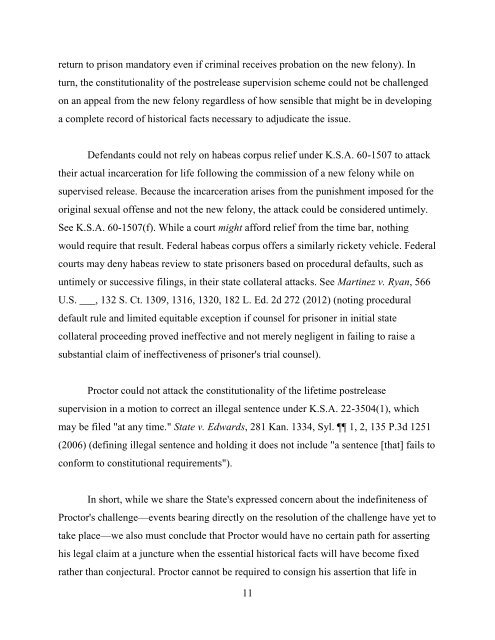State v. Proctor - Kansas Judicial Branch
State v. Proctor - Kansas Judicial Branch
State v. Proctor - Kansas Judicial Branch
Create successful ePaper yourself
Turn your PDF publications into a flip-book with our unique Google optimized e-Paper software.
eturn to prison mandatory even if criminal receives probation on the new felony). In<br />
turn, the constitutionality of the postrelease supervision scheme could not be challenged<br />
on an appeal from the new felony regardless of how sensible that might be in developing<br />
a complete record of historical facts necessary to adjudicate the issue.<br />
Defendants could not rely on habeas corpus relief under K.S.A. 60-1507 to attack<br />
their actual incarceration for life following the commission of a new felony while on<br />
supervised release. Because the incarceration arises from the punishment imposed for the<br />
original sexual offense and not the new felony, the attack could be considered untimely.<br />
See K.S.A. 60-1507(f). While a court might afford relief from the time bar, nothing<br />
would require that result. Federal habeas corpus offers a similarly rickety vehicle. Federal<br />
courts may deny habeas review to state prisoners based on procedural defaults, such as<br />
untimely or successive filings, in their state collateral attacks. See Martinez v. Ryan, 566<br />
U.S. ___, 132 S. Ct. 1309, 1316, 1320, 182 L. Ed. 2d 272 (2012) (noting procedural<br />
default rule and limited equitable exception if counsel for prisoner in initial state<br />
collateral proceeding proved ineffective and not merely negligent in failing to raise a<br />
substantial claim of ineffectiveness of prisoner's trial counsel).<br />
<strong>Proctor</strong> could not attack the constitutionality of the lifetime postrelease<br />
supervision in a motion to correct an illegal sentence under K.S.A. 22-3504(1), which<br />
may be filed "at any time." <strong>State</strong> v. Edwards, 281 Kan. 1334, Syl. 1, 2, 135 P.3d 1251<br />
(2006) (defining illegal sentence and holding it does not include "a sentence [that] fails to<br />
conform to constitutional requirements").<br />
In short, while we share the <strong>State</strong>'s expressed concern about the indefiniteness of<br />
<strong>Proctor</strong>'s challenge—events bearing directly on the resolution of the challenge have yet to<br />
take place—we also must conclude that <strong>Proctor</strong> would have no certain path for asserting<br />
his legal claim at a juncture when the essential historical facts will have become fixed<br />
rather than conjectural. <strong>Proctor</strong> cannot be required to consign his assertion that life in<br />
11

















